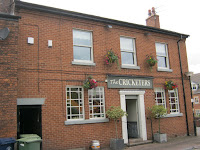 The Best Pubs Around Merseyside is an old CAMRA guide from 1990, and I contrasted in 2011 and 2013 what it wrote about pubs and breweries at that time with the situation as it is now. A 'stop press' item in the guide reported that Boddington's, which owned Liverpool brewery Higson's, had sold all its brewing interests to Whitbread. It explained sadly that "all indications are that Higson's, Liverpool's only brewery, will close in the very near future with the consequential loss jobs and the loss of the last Mild and Bitter beers brewed in Liverpool. So-called Higson's beers brewed elsewhere, particularly by Whitbread, will not be the same." This gloomy prognosis proved correct in every respect, and the general view was that we wouldn't see brewing in the city again.
The Best Pubs Around Merseyside is an old CAMRA guide from 1990, and I contrasted in 2011 and 2013 what it wrote about pubs and breweries at that time with the situation as it is now. A 'stop press' item in the guide reported that Boddington's, which owned Liverpool brewery Higson's, had sold all its brewing interests to Whitbread. It explained sadly that "all indications are that Higson's, Liverpool's only brewery, will close in the very near future with the consequential loss jobs and the loss of the last Mild and Bitter beers brewed in Liverpool. So-called Higson's beers brewed elsewhere, particularly by Whitbread, will not be the same." This gloomy prognosis proved correct in every respect, and the general view was that we wouldn't see brewing in the city again.The writers had no way of knowing that within two and a half decades, Britain would have more breweries than at any time since the 1930s. Six months ago the Liverpool Echo listed 19 breweries in Merseyside, also mentioning several others slightly further afield. Sales of real ale are standing up with actual increases reported in recent years, in contrast to the beer market as a whole which remains in decline, although the rate of decline is slowing.
The reduction of beer sales mirrors the continuing closures of pubs every year. There are new outlets such as micropubs and small niche bars opening up, but while these are welcome and many seem to be doing well, they tend to be small and don't replace all the pub capacity lost to closures.
I've written before that at some point the simultaneous phenomena of more breweries and fewer pubs will collide. I was chatting to the licensee of a real ale pub last week and he was telling me that we are beginning to lose small breweries to closures, a process he saw accelerating in coming months and years. While some new breweries may still open, I can't see the increases we've seen in recent years continuing indefinitely as we edge closer to market saturation.
I suppose that brewers who don't have to rely on beer sales for their livelihood might be able to survive better by undercutting their competitors, but that isn't a good long-term strategy for the industry as a whole. Given a broader choice, customers are increasingly expecting quality as standard, and brewers whose products are inconsistent or lacklustre will go to the wall.
The proud talk of there being a record number of breweries describes a situation that is not sustainable in the long term, and I expect that at some point we'll be mourning the demise of some of the breweries whose existence we are now celebrating. We're probably enjoying something of a golden age, but golden ages never last.

























